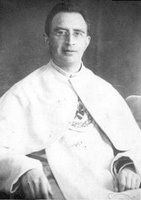
One thing that allows saddens me is seeing far too many scientists denying God and giving all of their proof to science. In reality, how do we know our methods of studying the world are correct? For hundreds of years science was based on the world revolving around the earth. I strongly believe that in the next 500 years, science will rapidly change and the people then will call our methods today "ancient" and "inaccurate".
Please see the post on
Catholics and the Theory of Evolution.
So, in light of this, I have very good news to report. Francis Collins, the famous scientist who led the team that cracked the human genome, is a Christian. After living as an "obnoxious atheist" since graduate school, Collins saw God through his parents' deaths. He truly converted to Christianity after reading C.S. Lewis's Mere Christianity, which is an excellent book. Now, Collins calls scientific discoveries an "opportunity to worship".
Collions plans to publish a book entitled
The Language of God: A Scientist Presents Evidence for Belief this summer explaining why he now believes in God and miracles.
Source: Times Online (UK)An Act of Reparation for those that don't believe:O Most Merciful Heart of Jesus, Divine Mercy-seat, for Whose sake the Eternal Father has promised that He would always hear our prayers! I unite myself to Thee in offering to Thine Eternal Father this poor and needy heart of mine, contrite and humbled in His Divine presence, and desirous of making complete reparation for the offenses that are committed against Him, especially those which Thou dost continually suffer in the Holy Eucharist, and more particularly those which I myself have unhappily so often committed. Would that I could wash them away with my tears, O Sacred Heart of Jesus, and blot out with my own heart's blood the ingratitude where with we have repaid Thy tender love. I unite my sorrow, slight as it is, with the mortal agony which caused Thy sweat to become as drops of blood in the Garden of Olives at the very thought of our sins. Do Thou offer it, dear Lord, to Thine Eternal Father in union with Thy Sacred Heart. Render Him infinite thanks for the manifold blessings which He constantly showers upon us, and let Thy love supply for our want of thankfulness and remembrance. Grant me the grace always to present myself in a spirit of deepest reverence before the face of Thy Divine Majesty, in order thus to repair in some measure the irreverences and outrages which I have dared to commit before Thee; grant also, that from this day forth, I may devote myself with all my might to drawing, both by word and example, many souls to know Thee and to experience the riches of Thy Heart. From this moment I offer and dedicate myself wholly to propagating the honor due to Thy most sweet Sacred Heart.
I choose It as the object of all my affection, and desires, and from this hour forevermore I set up in It my perpetual abode, thanking, adoring and loving It with all my heart, inasmuch as It is the Heart of my Jesus, Who is worthy to be loved, the Heart of my King and sovereign Lord, the Bridegroom of my soul, my Shepherd and Master, my truest Friend, my loving Father, my sure Guide, my unfailing protection and my everlasting blessedness. Amen.
Image: Pope Pius XII
 Going to confession regularly has given me a new appreciation for this sacrament. I often ask why people don't go to confession today more than they do. It can't be that we're sinning less. Can we have lost our appreciation for the sacrament of reconciliation because we no longer realize how terrible sin is? Is it that we no longer appreciate the suffering and death of Jesus, that he died for us? Do we no longer realize that all we have to do, to claim the benefits of his suffering, is to confess our sins and to rely on his mercy?
Going to confession regularly has given me a new appreciation for this sacrament. I often ask why people don't go to confession today more than they do. It can't be that we're sinning less. Can we have lost our appreciation for the sacrament of reconciliation because we no longer realize how terrible sin is? Is it that we no longer appreciate the suffering and death of Jesus, that he died for us? Do we no longer realize that all we have to do, to claim the benefits of his suffering, is to confess our sins and to rely on his mercy?













